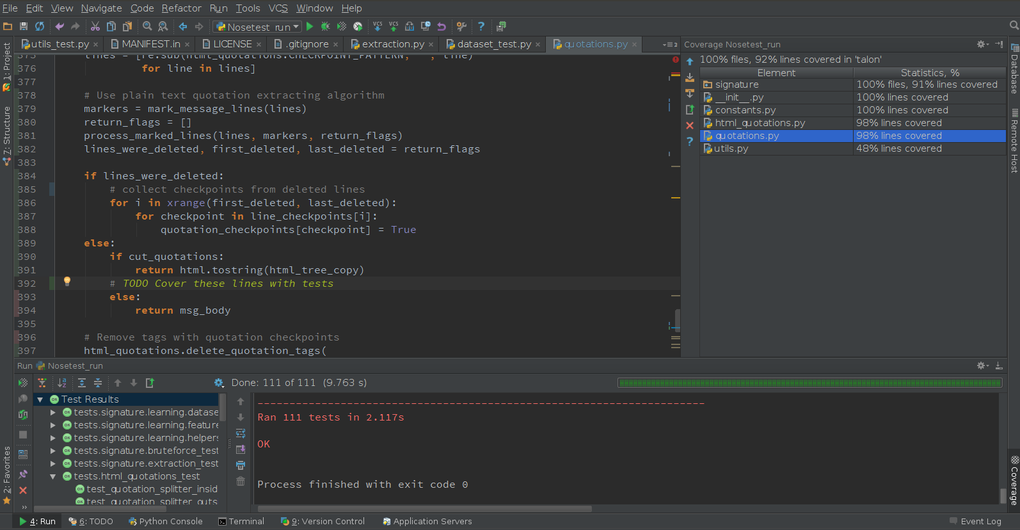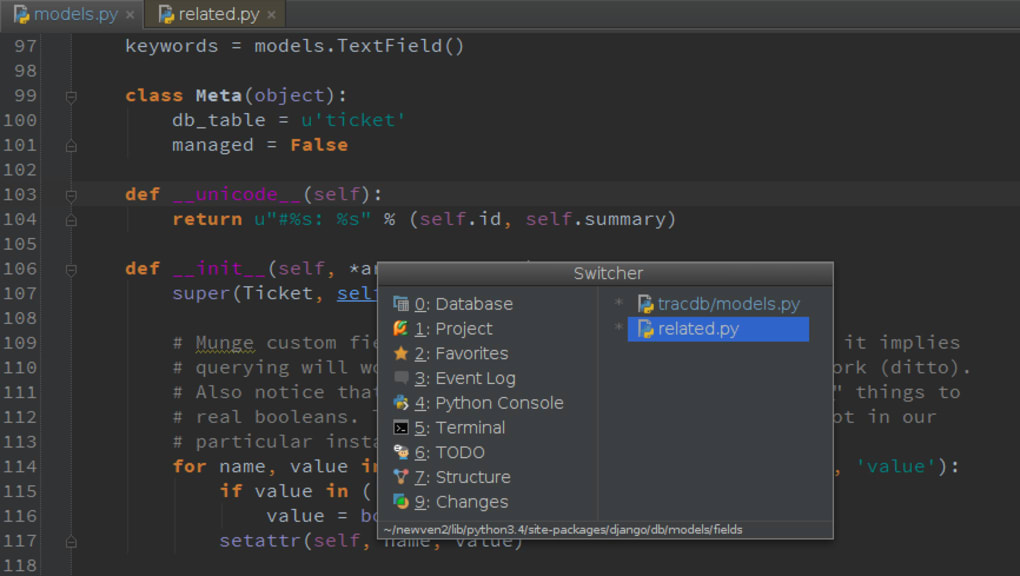PyCharm Community Edition is a powerful, free, and open-source Integrated Development Environment (IDE) specifically designed for Python developers. Developed and published by JetBrains, this freeware provides a robust set of tools for writing, debugging, and testing Python code, offering a compelling alternative to its paid professional counterpart. Available on Windows, macOS, and Linux, PyCharm Community Edition caters to a wide range of users, from students and hobbyists to professional developers working on smaller-scale projects.
What is PyCharm Community Edition?
In response to the growing demand for accessible Python development tools, JetBrains created PyCharm Community Edition to empower individuals of all skill levels to engage with Python programming. This freeware provides a user-friendly environment for building, debugging, executing, and testing Python code, streamlining the development workflow. Key features include intelligent code completion, code inspection for early error detection, and a streamlined Python console for interactive coding. The IDE’s intuitive interface simplifies complex tasks, making it an ideal tool for both beginners learning Python and experienced developers seeking a lightweight yet effective IDE. Furthermore, its open-source nature allows for community contributions and enhancements, fostering continuous improvement and development.
Key Features and Capabilities

PyCharm Community Edition, despite being a free offering, packs a significant punch in terms of functionality. Its core features include:
-
Intelligent Code Completion: The IDE anticipates your coding needs, offering suggestions as you type, significantly accelerating the development process and reducing the risk of typos. This feature is especially beneficial for beginners, providing a learning aid and reducing common coding errors.
-
Code Inspection: PyCharm Community Edition performs static code analysis, identifying potential issues and bugs in your code before you run it. This proactive approach to debugging saves valuable time and effort in the long run, resulting in more robust and reliable applications.
-
Graphical Debugger: The integrated debugger allows you to step through your code line by line, inspect variables, and identify the source of errors effectively. This powerful tool is indispensable for effectively troubleshooting and resolving issues within your Python programs.
-
Test Runner: PyCharm seamlessly integrates with various testing frameworks, allowing you to execute unit tests and identify areas of your code that require further refinement. This feature promotes writing high-quality, well-tested code, enhancing the reliability and maintainability of your projects.
-
Refactoring Tools: The IDE provides a range of refactoring tools to help improve the structure and readability of your code. These tools simplify complex code modifications, making large-scale refactoring tasks less daunting and promoting code maintainability.
-
Version Control System (VCS) Support: PyCharm Community Edition offers robust support for popular version control systems like Git, allowing for seamless integration with collaborative development workflows. This support streamlines code management, version tracking, and collaborative development among team members.
-
Python Console: The integrated Python console provides an interactive environment for experimenting with code, testing snippets, and gaining a deeper understanding of Python’s functionality. This interactive shell is a valuable tool for both learning and development.
-
Navigation and Search: The IDE provides efficient navigation and search capabilities, allowing you to quickly locate specific files, classes, methods, and variables within your projects, irrespective of project size. This function dramatically speeds up coding and debugging.
While PyCharm Community Edition lacks certain advanced features found in its Professional counterpart (such as database support, web framework support, and remote development capabilities), its core functionality provides a solid foundation for many Python development tasks. This streamlined approach keeps the IDE lightweight and responsive, ideal for developers focusing on core Python programming.
Getting Started with PyCharm Community Edition
Using PyCharm Community Edition is remarkably straightforward. After downloading and installing the IDE, you’re greeted with a welcome screen offering options to create new projects, open existing ones, or check out projects from version control systems.
Creating a new project involves specifying project settings such as the location, interpreter, and any necessary libraries. Opening an existing project allows you to quickly access and continue working on previously saved code. Checking out a project from version control (like Git) facilitates collaborative development and version management.
The IDE’s intuitive interface features a project view displaying all files and folders within your project, allowing easy navigation. You can open, edit, and create new files directly within the IDE, using context menus to select the desired file type (Python, HTML, etc.).
Executing your code is simple; right-clicking on a file and selecting “Run” initiates the execution process. The output appears in a dedicated console window, allowing for easy monitoring of your program’s execution and any potential errors. The debugging features are accessible similarly, enabling efficient identification and resolution of bugs within the code.
PyCharm Community Edition vs. Other IDEs
PyCharm Community Edition isn’t the only IDE available for Python development. Several alternatives exist, each with its strengths and weaknesses. Some popular alternatives include:

-
Spyder: A free and open-source IDE primarily focused on scientific computing, Spyder provides excellent support for data analysis and visualization libraries like NumPy, SciPy, and Matplotlib. While it’s a strong contender for data science projects, it may lack the breadth of features and overall polish found in PyCharm.
-
Atom: A free and open-source text editor developed by GitHub, Atom boasts extensive customization options and a large community contributing plugins and extensions. While flexible and highly configurable, it requires the installation of numerous plugins to provide comparable functionality to PyCharm.
-
Visual Studio Code (VS Code): A free and open-source code editor developed by Microsoft, VS Code has gained immense popularity for its versatility, extensibility, and strong debugging capabilities. Its vast plugin ecosystem allows for customization and support for a variety of programming languages. Like Atom, it requires the addition of several extensions to match PyCharm’s Python-specific features.
- Sublime Text: A commercial text editor with a free trial, Sublime Text is known for its speed, performance, and elegant interface. It’s a highly efficient editor but lacks the extensive built-in features of an IDE like PyCharm. After the trial period, a license must be purchased for continued use.
Choosing the best IDE often depends on individual preferences and project requirements. PyCharm Community Edition stands out for its balance of ease of use, robust core features, and community support. While it may not be the most feature-rich option, it’s an excellent choice for developers focused on Python development without the need for specialized advanced functionalities found in the commercial edition.
What’s New in Recent Versions?
PyCharm Community Edition undergoes regular updates, introducing new features, improvements, and bug fixes. Recent versions have focused on enhancing performance, improving support for modern Python features, and addressing user feedback. Specific updates may include enhancements to Django support, improved handling of large datasets during debugging, smoother integration with typed dictionaries, and optimized debugger performance. These ongoing updates reflect the commitment to continuous improvement and the responsiveness to the needs of the developer community. Regularly checking for updates ensures you have access to the latest features and performance enhancements.
Conclusion
PyCharm Community Edition is a compelling choice for Python developers seeking a free, open-source, and user-friendly IDE. Its powerful features, combined with its intuitive interface and active community support, make it an excellent option for both beginners and experienced programmers. While it lacks the advanced features of the professional version, its core functionality is more than sufficient for many Python development projects, making it a valuable tool in any developer’s arsenal. The balance between functionality, ease of use, and accessibility solidifies its position as a leading free IDE within the Python development ecosystem.
File Information
- License: “Free”
- Latest update: “June 9, 2025”
- Platform: “Windows”
- OS: “Windows 7”
- Language: “English”
- Downloads: “937.1K”
- Size: “865.92 MB”
















